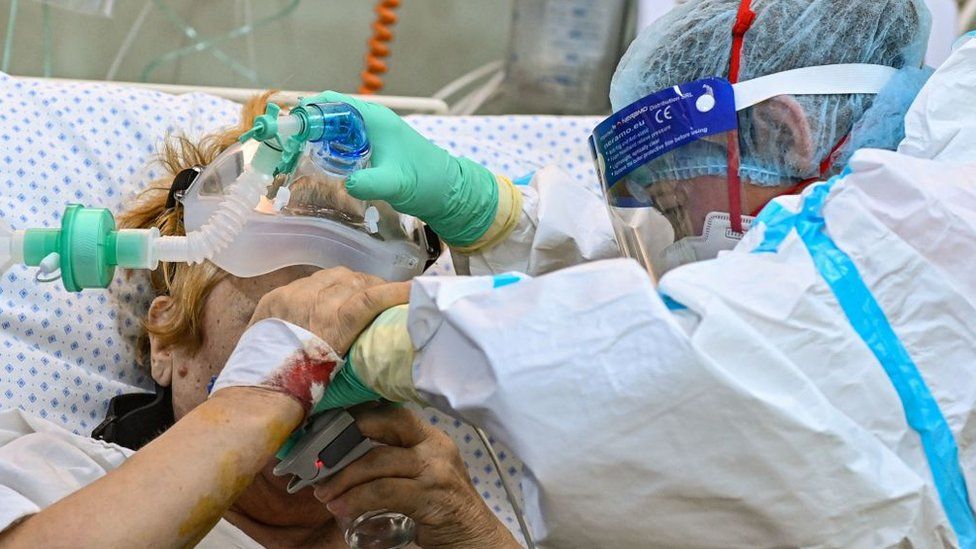Covid: Romania's health system torn apart by pandemic
- Published

"School holidays start on Monday," President Klaus Iohannis announced glumly.
Initially for two weeks, but no-one dares guess when children might return, because Romania is in the grip of a wave of Covid-19 far more deadly than anything it experienced until now.
To make matters worse, Romania has had no effective government since the start of the month.
The purple and red patches on the map, indicating high levels of the virus, adjusted daily by researchers at the Babes-Bolyai University in Cluj, continue to spread.
Romania's 2,000 intensive care beds are all full, and patients are now having to wait outside. The first 50 critically ill patients have been transferred to hospitals in Hungary and Poland.
"Sometimes I feel like the whole country has become a resuscitation department," said Dorel Sandesc, head of intensive care at Timisoara hospital in western Romania.
"It is a national failure on all levels. We are witnessing a kind of national blindness, caused by the lack of education, by the lack of civilisation," Dr Sandesc, who's vice-chairman of the Romanian Society of Anaesthesia and Intensive Care, told the Puterea a Cincea website.
Vaccination levels now stand at little more than 29% of the whole population and 34% of the adult population, the second lowest in the EU after Bulgaria.
Politicians are blaming the public for refusing to get vaccinated and believing conspiracy theories about the danger of the vaccines.
The public blames the politicians - for poor leadership, inadequate healthcare, and above all for vanity and corruption.
This weekend, the latest "vaccination marathon" is being held in the capital, Bucharest, with six centres open 24 hours a day, to encourage the reluctant. In the first two hours on Friday more than 1,000 people got the jab.
Back in June Romania's decision to relax restrictions was hugely popular and loudly trumpeted by then Prime Minister Florin Citu. Medical commentators felt it was rash and irresponsible.
Romania's healthcare system, stretched to capacity by years of both neglect and corruption, is coming apart at the seams, despite the everyday heroics of medical staff.
Now, on a seven-day average, 15,000 people a day are testing positive in this population of 19.4 million:
- 574 people died last Tuesday
- On average 389 deaths per day over seven days
- 226 people have died per million in the past 14 days
- EU average is 24 deaths per million
At the vaccination centre in Rosiori de Vede, a small town nearly two hours south-west of Bucharest, they've just moved the vaccination centre from the sports stadium to a pensioner's club with just two rooms.
"We had to scale down because the gym was too big for the low number of people getting vaccinated in our town," says Liliana Catrinoiu, director of the centre.
"A large part of the population preferred to believe all the alarmist and sensational news related to vaccination."
During the summer, Romania sold on unwanted vaccines to Ireland, Denmark and Vietnam, because of low domestic interest.
- COVID IN RUSSIA: Vaccine rejection drives pandemic
- VACCINATION DRIVE: Dracula's castle offers tourists Covid vaccine
From Monday, masks will be compulsory nationwide, inside and outside buildings, and the unvaccinated will not be allowed out on the streets after 20:00. How strictly this will be enforced is another matter.
In Piata Unirii in Timisoara, a waiter at an up-market bar overheard one customer telling another that he was not vaccinated, just as he was putting their drinks down on the table.
"Drink up fast,", he remarked, looking around for any sign of the Gendarmerie. "But then you must leave."
At a wedding last weekend in the north-eastern city of Botosani, the groom was refused entry to his own wedding party, after testing positive, according to local media.
There was no information about the couple's whereabouts later that evening.
The Orthodox Church in Romania has been fiercely criticised by medical professionals for pouring doubt on the safety and efficacy of the vaccines, although a Church spokesman last week publicly urged people to get vaccinated.
"In the first wave of the pandemic, Father Bartolomeu died," Father Atal, a monk wrote to me from the Orthodox monastery at Dervent, on the shore of the River Danube in eastern Romania.
"Then the rest of us either went through Covid with mild symptoms, or got vaccinated."
There are currently three cases in the monastery, one aged 78, another 35, another 30. All with moderate symptoms, all in isolation in their rooms.
"I go down to the river at least once a week. It flows quietly. The river has seen other pandemics and knows that man wins in the end, with all the sacrifices involved."
Additional reporting by Mircea Barbu.
Related Topics
- Published16 November 2020
- Published14 November 2020